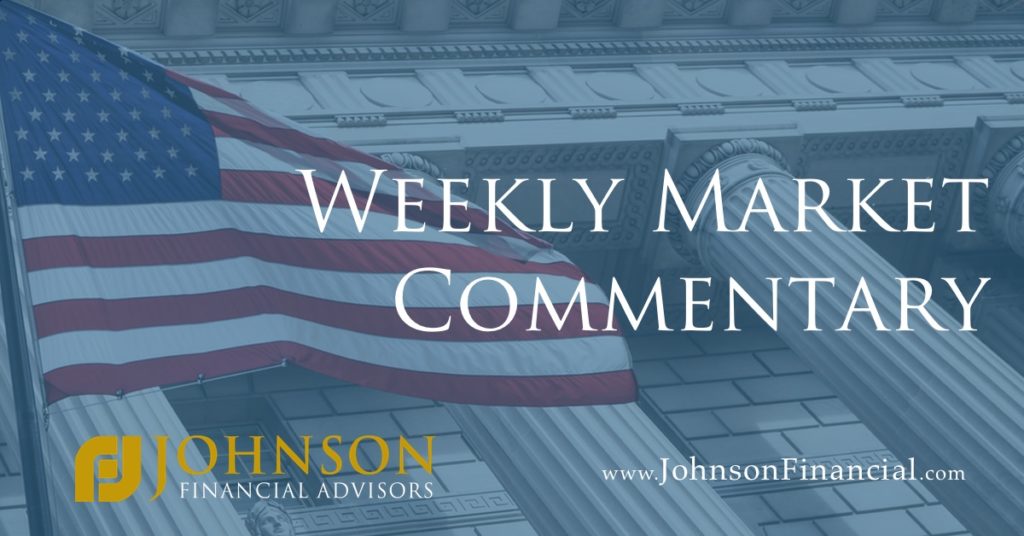
Weekly Market Commentary – 01/02/2018
The Markets
Last week, Wall Street closed a year that brought a series of record highs. The three major indexes achieved their best yearly performance since 2013. But there was little celebration Friday with stocks ending lower, thanks to losses in financial and technology stocks. For the week, the Dow fell 0.14 to close at 24,719.22. The S&P lost 0.33 percent to finish at 2,673.61, and the NASDAQ dropped 0.81 percent to end the week at 6,903.39.
- New single-family home sales increased 17.5% in November, up 26.6% from a year ago
- The months’ supply of new homes fell to 4.6 months in November from 5.4 months in October
- The average price of new homes sold was $377,100, up 3.8% from last year
- Personal income rose 0.3% in November, and is up 3.8% in the past year
- Personal consumption rose 0.6% in November, and is up 4.5% in the past year
- The PCE deflator rose 2.0% in November, up 1.8% from a year ago
- Core PCE, which excludes food and energy, rose 0.1% in November and is up 1.5% in the past year
- The Conference Board Consumer Confidence index decreased in December, and now stands at 122.1
- The Markit US Manufacturing PMI rose to 55.1 in December, the highest reading since March of 2015
- The PMI is up from 53.9 in November, and up from 54.3 a year ago
- The probability of a rate hike during the Federal Reserve meeting in January stands below 1%, while there is a 69.7% probability of a hike in March
| Returns Through 12/29/17 | 1 Week | YTD | 1 Year | 3 Year | 5 Year |
| Dow Jones Industrials (TR) | -0.14 | 28.11 | 28.11 | 14.36 | 16.37 |
| NASDAQ Composite (PR) | -0.81 | 28.24 | 28.24 | 13.38 | 17.98 |
| S&P 500 (TR) | -0.33 | 21.83 | 21.83 | 11.41 | 15.79 |
| Barclays US Agg Bond (TR) | 0.51 | 3.54 | 3.54 | 2.24 | 2.10 |
| MSCI EAFE (TR) | 0.90 | 25.03 | 25.03 | 7.80 | 7.90 |
Growing — The U.S. economy has been growing for the last 99 months (i.e., no recession), an expansion exceeded in length only two times since 1900 (source: National Bureau of Economic Research, BTN Research).
In and Out — The U.S. imports 22 percent less oil than it did just a decade ago. Oil imports averaged 7.9 million barrels a day in 2016, down from 10.1 million barrels a day in 2006. Total petroleum exports from the U.S. have quadrupled over the last decade, rising from 1.3 million barrels a day in 2006 to 5.2 million barrels a day in 2016 (source: Department of Energy, BTN Research).
Building New Homes — Permits for the construction of 6.14 million single-family homes were issued during the four years of 2003-2006. Permits for the construction of 6.08 million single-family homes were issued during the 10 years of 2007-2016 (source: Joint Center for Housing Studies of Harvard University, BTN Research).
WEEKLY FOCUS – The Benefits of a Family Meeting
Now that you have prepared your estate plan, have you considered having a family meeting to discuss it? A UBS Investor Watch report found 83 percent of benefactors surveyed have a will, but only 54 percent have had a meeting to discuss their plans with their heirs.
This may be one reason behind some troubling statistics. According to a study by the Williams Group Wealth Consultancy, 70 percent of wealthy families lose their wealth by the second generation, and 90 percent lose it by the third generation. It appears family members often lack sufficient knowledge and wisdom to use their inheritance responsibly. That is why a growing number of advisors are working to educate and empower future generations through family meetings.
The primary goal of this type of meeting is to create an awareness of estate planning choices you have made, and most importantly, the reasoning behind your decisions. It took time and planning to prepare your financial affairs, and sharing them can encourage unity within your family by building bridges across sensitive topics, such as life, death, wealth and taxes. Equipping loved ones with knowledge brings understanding and acceptance.
A family meeting brings you and your heirs together to talk about the careful plans you have made. It’s an opportunity to provide a high-level review of your will, explain any trusts you’ve set up, discuss who you’ve designated as executor and why, and share contact details for your attorney and the location for important documents. It often covers your health care directives, long-term care desires and your durable and health care power of attorney. This equips loved ones with the information they will need when you are no longer available or mentally capable to provide it.
Beyond that, you can foster the success of future generations by sharing principles that helped you accumulate wealth, lessons you learned, the importance of investing at an early age and how you hope your heirs might use their inheritance. Having this conversation is the best measure you can take to equip your heirs to continue your legacy to the second generation and beyond.
As your trusted advisor, I am happy to facilitate a conversation about your legacy plan and educate your family members on essential financial concepts. Why not contact our office today to arrange a family meeting at your convenience?
